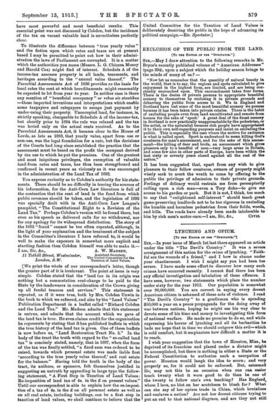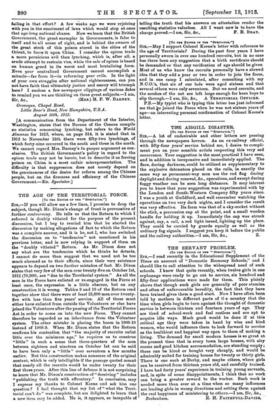LYNCHING AND OPIUM.
[To TER EDITOR OF TRI " SPRCTLTOR."]
your issue of March 1st last there appeared an article under the title "The Devil's Country." It was a severe arraignment of this nation for the crime of lynching. " Faith- ful are the wounds of a friend," and I bow in shame under your chastisement. I wish I might say you had been too severe. I have made some effort to discover how many such crimes have occurred recently. I cannot find there has been any official investigation and tabulation of these offences. I have seen, however, two statements which place the number under sixty for the year 1912. Our population is somewhat over 90,000,000. You are correct in saying every decent American citizen is ashamed of these acts of violence. I read "The Devil's Country" to a gentleman who is spending $50,000 a year on a peace propaganda for the doing away of war between nations, hoping be might see his way clear to devote some of his time and money to investigating this form of national warfare. He made no promise to do so, and while expressing his horror of lynching and all its barbarities he bade me hope that in time we should outgrow this evil—which is cold comfort, but it emphasizes how difficult a matter it is to reach.
I wish your suggestion that the town of Houston, Miss., be deprived of its franchise and placed under a dictator might be accomplished, but there is nothing in either a State or the Federal Constitution to authorize such a usurpation of power. Houston would laugh the idea to scorn ; and very properly so, for it could not be enforced. But, esteemed Sir, may not this be an occasion when one can easier teach twenty what it were good to do than be one of the twenty to follow one's own teaching P Has England, whom I love, no blot on her scutcheon to blush for ? What can she say of her opium trade in China, which brutalizes and enslaves a nation? Are not her decent citizens trying to put an end to that national disgrace, and are they not still
failing in that effort ? A few vieeks ago we were rejoicing with you in the enactment of laws which would stop at once that age-long national shame. Now we learn that the British Government, the great exemplar in Governments, is false to itself and to all sense of right, and is behind the owners of the great stock of this poison stored in the cities of the Orient, to force it upon China. I consider the opium trade a more pernicious evil than lynching, which is, after all, a crude attempt to restrain vice, while the sale of opium is based on human greed in its worst and most brutalizing form. Even your centralized Government cannot accomplish a miracle—far from it—in reforming your evils. In the light of your own struggles after national righteousness, can you not have faith that ultimately justice and mercy will triumph here? I enclose a few newspaper clippings of various dates to remind you we are thinking on these great subjects.—I am,
Oronoque, Chapel Road, Little Boar's Head, New Hampshire, U.S.A.
August 30th, 1913.
[A communication from the Department of the Interior, Washington, states that the Bureau of the Census compile no statistics concerning lynching, but refers to the World Almanac for 1913, where, on page 314, it is stated that in 1912 to November 15th there were fifty-two lynchings, of which forty-nine occurred in the south and three in the north. We cannot regard Mrs. Barney's tu quo quo argument as con- clusive. The British Government's policy in regard to the opium trade may not be heroic, but to describe it as forcing poison on China is a most unfair misrepresentation. The difficulty is that suppression does not merely depend on the genuineness of the desire for reform among the Chinese people, but on the firmness and efficiency of the Chinese Govern men t.—En. Spectator.]











































 Previous page
Previous page